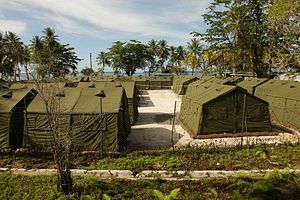The Australian government has repealed legislation that allowed asylum seekers and refugees held in offshore detention facilities to be evacuated to mainland Australia for urgent medical treatment.
The medical evacuation law was passed against the government’s will earlier this year, but last week Independent senator Jacquie Lambie, who held the crucial vote on the proposal, voted with the coalition government to repeal the law during an emotional speech to the Senate.
“I put up to the Government a proposal to work with me to secure my support for the passage of the repeal of medevac,” she said.
“I am not being coy or silly when I say I genuinely can’t say what I proposed. I know that’s frustrating to people and I get that… But when I say I can’t discuss it publicly due to national security concerns, I am being 100 percent honest to you.”
The medevac law allowed doctors in Australia’s offshore detention facilities, on Manus Island and in Nauru, to approve the transfer of sick refugees to Australia. The law gave the Home Affairs Minister only 72 hours to object and only on clear national security grounds.
In June, an independent health assessment concluded that 97 percent of those held in detention had been diagnosed with physical health conditions and a further 91 percent are experiencing mental health problems, including severe depression and PTSD.
A parliamentary inquiry into the matter received 95 public submissions. One submission, lodged by three of the lead doctors who assessed the medical transfer applications, claimed that the average offshore patient seeking medical transfer to Australia had 4.6 serious ailments and that 31 percent were attempting suicide.
Only two of the 95 submissions were in favor of repealing the law. Unashamedly, the two submissions were from the Department of Home Affairs and the International Health and Medical Service, a government-contracted health provider for the detention facility in Nauru.
The coalition government has long maintained that lax immigration policies are a threat to Australian national security and views medevac as a loophole. When the bill first passed, the government’s leader in the Senate, Mathias Cormann, said it would give a green light to people smugglers and claimed the law would allow “rapists, murderers and pedophiles” into the country.
Lambie, during her speech to the Senate, claimed she made a deal with the government to secure her vote on the appeal.
Cormann, however, has routinely denied that the government made any deal with Lambie. “Let me just make the most important point right up front – there is no secret deal,” he told the parliament. “Let me repeat that again. There is no secret deal.”
Greens leader Richard Di Natale went on to accuse either Lambie or Cormann of misleading the parliament. “We had Minister Cormaan say that there was no deal. Now we’ve just heard Senator Lambie say there is a deal,” he said. “Who’s lying? Minister Cormann, are you lying? Or is Senator Lambie lying?”
Shadow Home Affairs Minister Kristina Keneally questioned whether Lambie had asked the government to accept a long-standing offer from New Zealand to resettle the refugees there.
Lambie refused to lay out the terms of the deal, citing national security concerns, but told parliament: “we’ve worked to an outcome I believe we both want… I am more than satisfied that the conditions are now in place to allow medevac to be repealed.”
Cormann later appeared on the ABC’s Insiders program and reiterated that the government had made no deal with Lambie in exchange for her support, but also avoided directly answering questions about the New Zealand option.
When Prime Minister Scott Morrison was asked by reporters at a press conference whether their policy included resettling refugees to New Zealand once the existing U.S. resettlement deal was exhausted, Morrison said: “The government is always looking at ways in which it can resettle those who are on Nauru.”
In September 2016, the Obama administration agreed to take up to 1,200 refugees from Manus and Nauru under a deal struck with then-Prime Minister Malcolm Turnbull. U.S. President Donald Trump has so far honored the agreement, despite calling it a “dumb deal.”
Australian Home Affairs Minister Peter Dutton recently told Sky News that the U.S. offer was “the most realistic” the government had looked at. He said 654 refugees had already been settled in the United States from Nauru and Manus Island, while another 251 had gained “provisional approval” to travel there.
GetUp human rights director Shan Narayanasamy said the decision to repeal medevac was devastating: “We all remember the crisis before medevac became law; 12 people died offshore and people faced serious delays before they received medical treatment,” she said.
The United Nations’ refugee agency said the medevac law had “proven to be a timely, effective and often life-saving safeguard.”
“As Australia retains responsibility for people forcibly transferred under its offshore arrangements, UNHCR urges the government of Australia to find appropriate solutions, including taking up the longstanding offer by New Zealand to resettle refugees and to prevent further harm,” the agency said in a statement following the repeal.
































